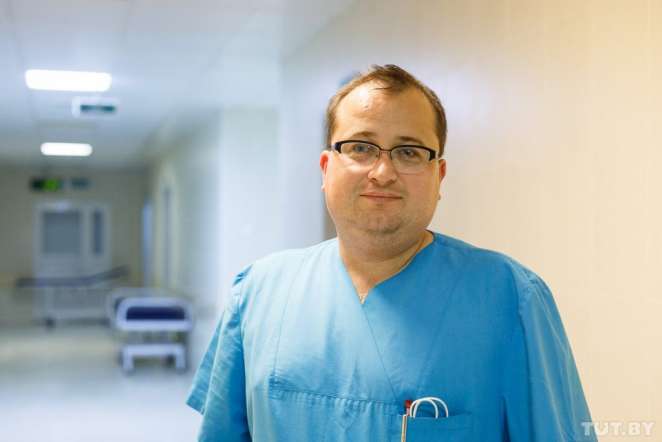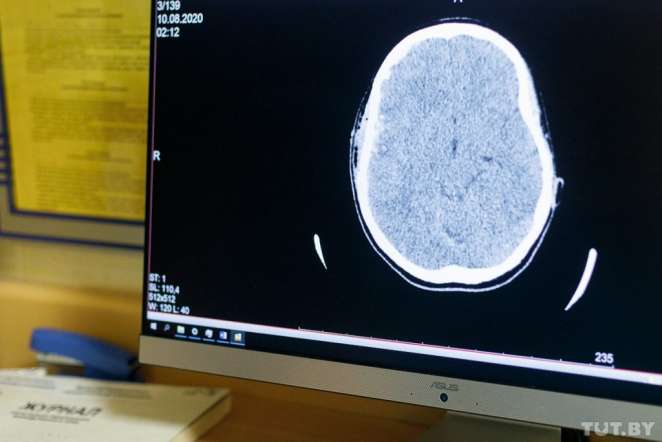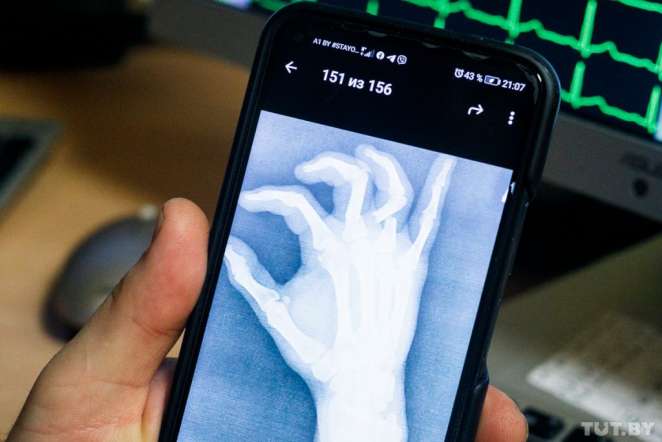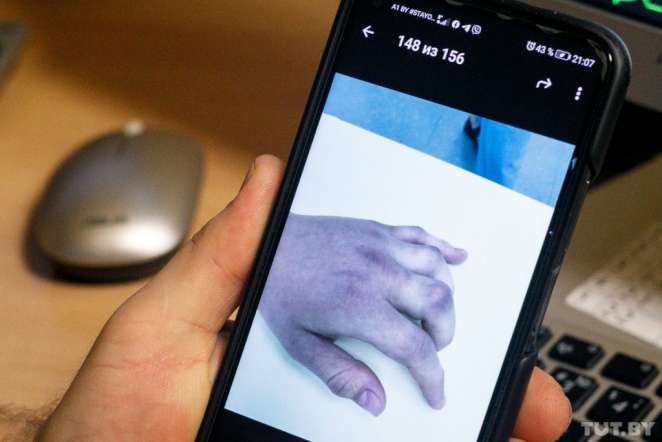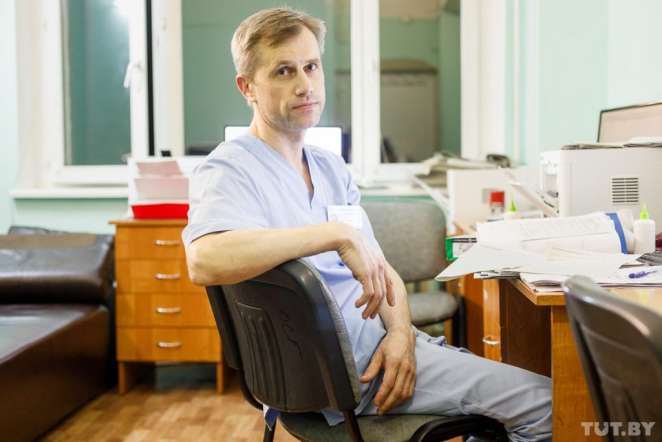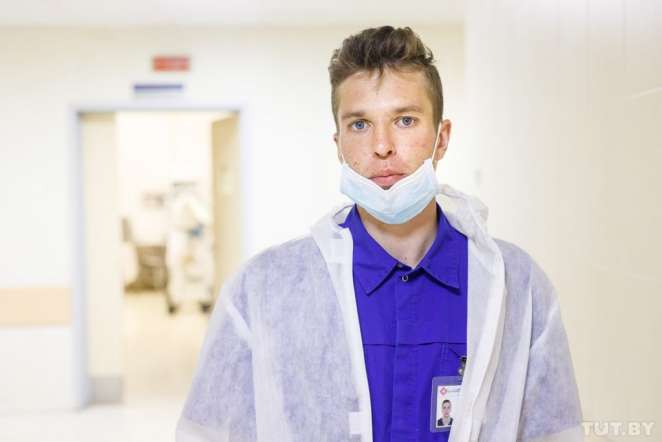“This Must Never Happen Again.” Doctors Who Treat People After Election Protests Speak
Belarusfeed
22 August 2020, 18:36
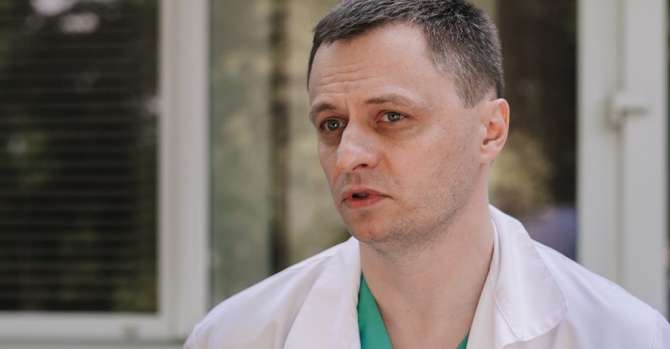 The medical personnel of Minsk emergency care hospital have been working overtime lately, but they do not complain: it is their duty. In addition to treating those who were injured during and after the protests, they have suddenly become “examiners”. And now a great part of their attention is paid to those who come to witness their injuries. There’s no choice, as the Forensic Examination Committee does not do that, and without an examination one cannot prove that he or she was subjected to violence.
The medical personnel of Minsk emergency care hospital have been working overtime lately, but they do not complain: it is their duty. In addition to treating those who were injured during and after the protests, they have suddenly become “examiners”. And now a great part of their attention is paid to those who come to witness their injuries. There’s no choice, as the Forensic Examination Committee does not do that, and without an examination one cannot prove that he or she was subjected to violence.
In the emergency care hospital, some people want to speak openly while others agree to speak anonymously. But everyone keeps saying one thing: this must never happen again. We didn’t ask them about their political views, just listened to their stories and recorded them. Three stories of three doctors and a story of a nurse who happened to visit detention centres in Okrestina street and in Zhodino.
Dmitry Yushkevich, the head of the department of surgery No. 4 (diagnostic department). Here they diagnose and perform surgeries if necessary. Dmitry has been on vacation for a week, but he worked on the night of August 9-10, and he is working this weekend too. He notices that we are surprised and asks: “Would you be on vacation at a time like this?”
He tells us about the patients he had to handle on the night after the elections. There were explosive-related injuries – the consequences of stun grenade attacks, as well as gunshot wounds.
— But they used rubber bullets.
— What’s the difference? Those are guns. The shooting principle of rubber bullets is also based on gunpowder, so all injuries like that are considered “gunshot wounds”. That night, there were patients with gunshot wounds caused by rubber and plastic bullets.
There were two patients that are hard to forget. One man was hit by a stun grenade and part of his foot had to be amputated. The second man was conscious, with no visible injuries, but was unable to speak. Dmitry supposes that he was in a state of shock.
— We’ve done 20% of work. I mean, our hospital is fully prepared for such emergencies: additional beds are arranged immediately, we have excellent staff, and we have extensive experience. For example, after the subway explosion in 2011, we had the best survival and recovery rates. But on the night of August 9-10, we received only some of the patients. A lot of people were taken to a military hospital, where the centre for the treatment of gunshot wounds and explosive-related injuries is situated. But we would have coped no worse, –Dmitry assures.
But still, there was enough work to do. He treated a total of 12 patients that night. Dmitry formulates his attitude to the situation clearly and concisely.
— It is no secret that there were people in a state of alcoholic intoxication, and we recorded that. It is no secret that there were also fringe group representatives. But there was also a huge number of ordinary people, against whom weapons and stun grenades were used. There are basic human needs – food, drink, toilet. At the protest they stand for an hour or, maybe, two, they scream, but time passes, and they disperse: sooner or later they need to drink, eat and go to the toilet. I believe that the use of force was not just unnecessary, it was excessive, beyond comprehension.
Doctors are cynics, they prepare for the worst, hoping for the best in their hearts. Dmitry can’t predict what will happen today or tomorrow.
— People are still being brought to us from Okrestina and Zhodino detention facilities. When this is over, there will be a second wave, people with complications after being injured there. But we can foresee this flow somehow.
The doctors of the emergency care hospital are ready for a large influx of patients.
— But in this case, we will have to focus on saving and treating people. And then we will be able to provide assistance with the examination on a smaller scale or will not be able to do that at all (since it is impossible to witness injuries and get a conclusion about the severity of injuries in the Forensic Examination Committee, even on a paid basis, people turn to the emergency care hospital). Only yesterday, we helped 160 people. We understand that there is no other way out, and even though our examination is not an official procedure, as we are not forensic doctors, our certificate is at least some guarantee for those people to defend their rights.
Nikolai Markevich, the resuscitator-anesthesiologist of the Intensive Care and Resuscitation Department for neurosurgical patients. Last week he only spent two nights at home, and he is joking that he will soon be kicked out of home for non-attendance.
— On August 9, they began to bring victims of clashes. I stood at the entrance to the hospital, examining and distributing patients: I sent some of them to the resuscitators from my department, some of them to the operating rooms, some of them to the exam rooms. There was a lot of work: we received about 35 people, and five people were admitted to the intensive care unit. The percentage of resuscitation patients was small, thanks God. We were ready, we had prepared additional facilities, and I’m happy we didn’t use them.
Nikolai remembered a guy who had a piece of his bicep probably torn out by a stun grenade fragment. And a man who had five or six rubber bullet wounds, including one on his larynx. And most of all the doctor remembered a 19-year-old patient, who had the misfortune of being near the place when a stun grenade exploded. Unfortunately, there were patients with similar injuries on August 10 and 11.
— Look, you see (we don’t understand exactly what we see on the CT scan that Nikolai shows us), all this is a brain contusion injury, subdural hematoma.
In the following days, the flow of patients from mass events fell sharply, but patients with severe injuries began to arrive after staying in Okrestina and in Zhodino detention centres. One of the young men says that he was beaten on August 12. He did not lose consciousness at the time of the injury. The diagnosis at admission is closed craniocerebral injury, brain concussion, bruises of the soft tissues of the head, body, face, and left lower limb. That means they hit the head, chest, buttocks and hip. And besides, a strong blow to the back caused pneumomediastinum (the presence of air in the mediastinum).
— Many of the patients had damage to muscle tissue many times exceeding the norm. What does this mean in practice? If we do not provide required medical care in hospital, it can lead to the development of acute kidney failure with all the consequences, up to death, — Nikolai emotionally explains why hematomas are dangerous and why it is so important to provide medical care for people beaten to blue bruises.
Nikolai also commented on those who are admitted for examination.
— People need to witness their injuries, to get them recorded. And in our waiting room, doctors are busy documenting injuries and bruises. And we must record everything, even if we are not professional examiners, people need to have some papers to defend their honour and dignity.
Doctors have no doubt that there must be a legal assessment of excessive use of force.
— Here, look, a wrist. Two fractures. Here’s the picture, here’s the radiograph. Why would a person purposefully break his hand? And these bruises? That is not right, is it? And when a person is shot point-blank with rubber bullets and massive soft tissue damage occurs? And those men’s rectal ruptures?
In recent days, Nikolai admits, peaceful protests have given him a bit of some festive spirit. The main thing, he says, is that we don’t go back to the nightmare that happened a week ago.
— On the night of August 10, I had a feeling of horror. And after that, I had that feeling. In the medical community, we regard the actions of the security forces as cruel, excessive and unjustified. If they took people, took them to the police department — why do they beat them?
Other doctors join the conversation and share their feelings.
— Outrage.
— Compassion.
— Helplessness.
— Anger.
At the same time, doctors emphasize, they do not divide people by political, professional or other criteria – all people are treated equally.
Alexei Zhukovsky is a surgeon in the trauma Department no. 1 (Concomitant Injuries). This is a very serious department – they bring here patients after car accidents or sometimes guys with broken legs and ruptured spleens after particularly violent fights. The leg should be handled by traumatologists, and the spleen rupture by surgeons, but you can’t split a patient for two different departments. This is why such patients are brought here: one team deals with intra-abdominal injury, and the other reassembles their bones.
The surgeon is not happy about our unexpected visit and does not hide it. He has a lot of paperwork, a lot of patients, and chronic fatigue. He curtly answers our questions.
— After the protests, our department, while I was on duty, received people mostly with bruises, light traumatic brain injuries, concussions, one patient was injured with a rubber bullet. Most of them did not need emergency surgical treatment, only two needed operations, and some of them were referred for outpatient treatment.
When Alexei was asked about his attitude to what was happening, he got emotional.
— My attitude? It’s easier to criticize, but you can’t create anything by criticizing. By criticizing, you can destroy what you already have. Please, if you do, criticize protest. But if we want it to get better, let’s work, build, invent, create, but not fight with the police. Unfortunately, some of the patients admitted in the early days were in a state of alcoholic intoxication. And, unfortunately, most of those who have been admitted to hospital, they simply do not realize what is happening. Many were involved accidentally, and many did not understand what consequences this situation could have for them. Many are just young and naive, and they are just interested in watching and participating. But is it possible to improve the situation through confrontation?
He offers an alternative to any protests, even if they are pronouncedly peaceful: to organize a party, involve lawyers to solve the problem, arrange a rock concert for crying out loud, – that is to come up with options for peaceful solutions to the problem.
— I am against blocking the roads: no ambulance could squeeze through them. I am against someone shooting at someone and someone throwing stones: these are future patients. It’s easy to criticize, but… Let’s create gradually. Something new. Something better. It is very important to manage yourself. Let’s redirect our resentment, our energy, into a peaceful course.
Alexei admits that it’s in his nature – he is sure that it is necessary to negotiate, and not to solve problems by force. And this applies to both participants of the rallies and riot police.
Vitaly Mekhovich, a nurse in the intensive care unit for neurosurgical patients, was detained on the evening of August 9 on Independence Avenue as he was walking home. It was just like everyone said: the van stopped, two men in black uniforms jumped out of it, one swept him off his feet, Vitaly sat down, they pulled him into the van and tied up his hands behind his back.
At first, there were 18 people in a six-person cell in Okrestina detention centre. The detainees, after talking to each other, found out that there was a minor among them, they told the guard, and the teenager was taken away. Half an hour later, six more people were brought in, and later one was taken away. When people started knocking on doors demanding reports, they released pepper gas through the “feeder” window into the cell.
— There is no ventilation, only a small window, so we breathed in this gas for about an hour. My eyes hurt, I couldn’t breathe.
The next day, they reassured the detainees: “We will let everyone go at night, be quiet.” When they came at night and took us out of the cell, someone began to quietly rejoice. It turned out rejoicing was premature: we were simply taken to another, four-person cell, where there were already some people. And so there were 45 people in that cell.
— Maybe they just wanted to see how many people would fit in a limited amount of space? Because a couple of hours later, we were returned to the previous cell. And they gave us a loaf of bread for 23 people.
On August 11, after lunch, Vitaly, in his own words, “found himself in front of the most humane and fair court in the world.” He was sentenced to 15 day’s imprisonment for participating in an unsanctioned protests where he allegedly shouted: “Long live Belarus” and “shame.” The same pattern was used to try his cellmates. After the trial, he was sent to a new cell, a double one, filled with 34 other people.
— But they gave us dinner! Oatmeal, cabbage, a pickle and a sausage!
And the next morning, Vitaly and others – about 250 people – were loaded into special vehicles. When “loading”, which was conducted by riot police, Vitaly was beaten. He had not been beaten before.
— They beat everyone they took in. And then they started picking on us: “You shouldn’t have been going out to these protests”. Well, it was a little funny, there were observers who were detained even before the elections, there were those detained at four o’clock in the afternoon on election day, when there were no actions, and someone was just detained near their home. But we were all silent, already knowing the consequences of speaking. On the way, we were told that “it’s nothing compared to what’s in Zhodino, real animals are working there.” What can I tell you? Zhodino is a resort. Even though the cells were packed with detainees, there were pillows, blankets! We were fed and not beaten. And two days later, they just let me go.
A crowd of volunteers met him at the gate. One of them took him to Minsk, and the next day the nurse went to work.
Since Vitaly works in medicine it was hard for him to face the lack of protection for the sick and wounded. As an example, he cited an elderly man in Okrestina.
— He was over 60 years old, he suffered from a heart disease, two toes were broken on his foot. When we asked to call an ambulance for him, it was called. When the doctors arrived, they said that he should be taken to hospital and X-rayed, but the full-time doctor in Okrestina refused, saying that “a couple of broken fingers will heal over time.” And he was transferred to Zhodino.
22 August 2020, 18:36

In the emergency care hospital, some people want to speak openly while others agree to speak anonymously. But everyone keeps saying one thing: this must never happen again. We didn’t ask them about their political views, just listened to their stories and recorded them. Three stories of three doctors and a story of a nurse who happened to visit detention centres in Okrestina street and in Zhodino.
Explosive-related injuries and gunshot wounds
Dmitry Yushkevich, the head of the department of surgery No. 4 (diagnostic department). Here they diagnose and perform surgeries if necessary. Dmitry has been on vacation for a week, but he worked on the night of August 9-10, and he is working this weekend too. He notices that we are surprised and asks: “Would you be on vacation at a time like this?”
He tells us about the patients he had to handle on the night after the elections. There were explosive-related injuries – the consequences of stun grenade attacks, as well as gunshot wounds.
— But they used rubber bullets.
— What’s the difference? Those are guns. The shooting principle of rubber bullets is also based on gunpowder, so all injuries like that are considered “gunshot wounds”. That night, there were patients with gunshot wounds caused by rubber and plastic bullets.
There were two patients that are hard to forget. One man was hit by a stun grenade and part of his foot had to be amputated. The second man was conscious, with no visible injuries, but was unable to speak. Dmitry supposes that he was in a state of shock.
— We’ve done 20% of work. I mean, our hospital is fully prepared for such emergencies: additional beds are arranged immediately, we have excellent staff, and we have extensive experience. For example, after the subway explosion in 2011, we had the best survival and recovery rates. But on the night of August 9-10, we received only some of the patients. A lot of people were taken to a military hospital, where the centre for the treatment of gunshot wounds and explosive-related injuries is situated. But we would have coped no worse, –Dmitry assures.
But still, there was enough work to do. He treated a total of 12 patients that night. Dmitry formulates his attitude to the situation clearly and concisely.
— It is no secret that there were people in a state of alcoholic intoxication, and we recorded that. It is no secret that there were also fringe group representatives. But there was also a huge number of ordinary people, against whom weapons and stun grenades were used. There are basic human needs – food, drink, toilet. At the protest they stand for an hour or, maybe, two, they scream, but time passes, and they disperse: sooner or later they need to drink, eat and go to the toilet. I believe that the use of force was not just unnecessary, it was excessive, beyond comprehension.
Doctors are cynics, they prepare for the worst, hoping for the best in their hearts. Dmitry can’t predict what will happen today or tomorrow.
— People are still being brought to us from Okrestina and Zhodino detention facilities. When this is over, there will be a second wave, people with complications after being injured there. But we can foresee this flow somehow.
The doctors of the emergency care hospital are ready for a large influx of patients.
— But in this case, we will have to focus on saving and treating people. And then we will be able to provide assistance with the examination on a smaller scale or will not be able to do that at all (since it is impossible to witness injuries and get a conclusion about the severity of injuries in the Forensic Examination Committee, even on a paid basis, people turn to the emergency care hospital). Only yesterday, we helped 160 people. We understand that there is no other way out, and even though our examination is not an official procedure, as we are not forensic doctors, our certificate is at least some guarantee for those people to defend their rights.
Cruel, excessive and unjustified
Nikolai Markevich, the resuscitator-anesthesiologist of the Intensive Care and Resuscitation Department for neurosurgical patients. Last week he only spent two nights at home, and he is joking that he will soon be kicked out of home for non-attendance.
— On August 9, they began to bring victims of clashes. I stood at the entrance to the hospital, examining and distributing patients: I sent some of them to the resuscitators from my department, some of them to the operating rooms, some of them to the exam rooms. There was a lot of work: we received about 35 people, and five people were admitted to the intensive care unit. The percentage of resuscitation patients was small, thanks God. We were ready, we had prepared additional facilities, and I’m happy we didn’t use them.
Nikolai remembered a guy who had a piece of his bicep probably torn out by a stun grenade fragment. And a man who had five or six rubber bullet wounds, including one on his larynx. And most of all the doctor remembered a 19-year-old patient, who had the misfortune of being near the place when a stun grenade exploded. Unfortunately, there were patients with similar injuries on August 10 and 11.
— Look, you see (we don’t understand exactly what we see on the CT scan that Nikolai shows us), all this is a brain contusion injury, subdural hematoma.
In the following days, the flow of patients from mass events fell sharply, but patients with severe injuries began to arrive after staying in Okrestina and in Zhodino detention centres. One of the young men says that he was beaten on August 12. He did not lose consciousness at the time of the injury. The diagnosis at admission is closed craniocerebral injury, brain concussion, bruises of the soft tissues of the head, body, face, and left lower limb. That means they hit the head, chest, buttocks and hip. And besides, a strong blow to the back caused pneumomediastinum (the presence of air in the mediastinum).
— Many of the patients had damage to muscle tissue many times exceeding the norm. What does this mean in practice? If we do not provide required medical care in hospital, it can lead to the development of acute kidney failure with all the consequences, up to death, — Nikolai emotionally explains why hematomas are dangerous and why it is so important to provide medical care for people beaten to blue bruises.
Nikolai also commented on those who are admitted for examination.
— People need to witness their injuries, to get them recorded. And in our waiting room, doctors are busy documenting injuries and bruises. And we must record everything, even if we are not professional examiners, people need to have some papers to defend their honour and dignity.
Doctors have no doubt that there must be a legal assessment of excessive use of force.
— Here, look, a wrist. Two fractures. Here’s the picture, here’s the radiograph. Why would a person purposefully break his hand? And these bruises? That is not right, is it? And when a person is shot point-blank with rubber bullets and massive soft tissue damage occurs? And those men’s rectal ruptures?
In recent days, Nikolai admits, peaceful protests have given him a bit of some festive spirit. The main thing, he says, is that we don’t go back to the nightmare that happened a week ago.
— On the night of August 10, I had a feeling of horror. And after that, I had that feeling. In the medical community, we regard the actions of the security forces as cruel, excessive and unjustified. If they took people, took them to the police department — why do they beat them?
Other doctors join the conversation and share their feelings.
— Outrage.
— Compassion.
— Helplessness.
— Anger.
At the same time, doctors emphasize, they do not divide people by political, professional or other criteria – all people are treated equally.
Many are just young and naive
Alexei Zhukovsky is a surgeon in the trauma Department no. 1 (Concomitant Injuries). This is a very serious department – they bring here patients after car accidents or sometimes guys with broken legs and ruptured spleens after particularly violent fights. The leg should be handled by traumatologists, and the spleen rupture by surgeons, but you can’t split a patient for two different departments. This is why such patients are brought here: one team deals with intra-abdominal injury, and the other reassembles their bones.
The surgeon is not happy about our unexpected visit and does not hide it. He has a lot of paperwork, a lot of patients, and chronic fatigue. He curtly answers our questions.
— After the protests, our department, while I was on duty, received people mostly with bruises, light traumatic brain injuries, concussions, one patient was injured with a rubber bullet. Most of them did not need emergency surgical treatment, only two needed operations, and some of them were referred for outpatient treatment.
When Alexei was asked about his attitude to what was happening, he got emotional.
— My attitude? It’s easier to criticize, but you can’t create anything by criticizing. By criticizing, you can destroy what you already have. Please, if you do, criticize protest. But if we want it to get better, let’s work, build, invent, create, but not fight with the police. Unfortunately, some of the patients admitted in the early days were in a state of alcoholic intoxication. And, unfortunately, most of those who have been admitted to hospital, they simply do not realize what is happening. Many were involved accidentally, and many did not understand what consequences this situation could have for them. Many are just young and naive, and they are just interested in watching and participating. But is it possible to improve the situation through confrontation?
He offers an alternative to any protests, even if they are pronouncedly peaceful: to organize a party, involve lawyers to solve the problem, arrange a rock concert for crying out loud, – that is to come up with options for peaceful solutions to the problem.
— I am against blocking the roads: no ambulance could squeeze through them. I am against someone shooting at someone and someone throwing stones: these are future patients. It’s easy to criticize, but… Let’s create gradually. Something new. Something better. It is very important to manage yourself. Let’s redirect our resentment, our energy, into a peaceful course.
Alexei admits that it’s in his nature – he is sure that it is necessary to negotiate, and not to solve problems by force. And this applies to both participants of the rallies and riot police.
I was on my way home, got arrested for 15 days
Vitaly Mekhovich, a nurse in the intensive care unit for neurosurgical patients, was detained on the evening of August 9 on Independence Avenue as he was walking home. It was just like everyone said: the van stopped, two men in black uniforms jumped out of it, one swept him off his feet, Vitaly sat down, they pulled him into the van and tied up his hands behind his back.
At first, there were 18 people in a six-person cell in Okrestina detention centre. The detainees, after talking to each other, found out that there was a minor among them, they told the guard, and the teenager was taken away. Half an hour later, six more people were brought in, and later one was taken away. When people started knocking on doors demanding reports, they released pepper gas through the “feeder” window into the cell.
— There is no ventilation, only a small window, so we breathed in this gas for about an hour. My eyes hurt, I couldn’t breathe.
The next day, they reassured the detainees: “We will let everyone go at night, be quiet.” When they came at night and took us out of the cell, someone began to quietly rejoice. It turned out rejoicing was premature: we were simply taken to another, four-person cell, where there were already some people. And so there were 45 people in that cell.
— Maybe they just wanted to see how many people would fit in a limited amount of space? Because a couple of hours later, we were returned to the previous cell. And they gave us a loaf of bread for 23 people.
On August 11, after lunch, Vitaly, in his own words, “found himself in front of the most humane and fair court in the world.” He was sentenced to 15 day’s imprisonment for participating in an unsanctioned protests where he allegedly shouted: “Long live Belarus” and “shame.” The same pattern was used to try his cellmates. After the trial, he was sent to a new cell, a double one, filled with 34 other people.
— But they gave us dinner! Oatmeal, cabbage, a pickle and a sausage!
And the next morning, Vitaly and others – about 250 people – were loaded into special vehicles. When “loading”, which was conducted by riot police, Vitaly was beaten. He had not been beaten before.
— They beat everyone they took in. And then they started picking on us: “You shouldn’t have been going out to these protests”. Well, it was a little funny, there were observers who were detained even before the elections, there were those detained at four o’clock in the afternoon on election day, when there were no actions, and someone was just detained near their home. But we were all silent, already knowing the consequences of speaking. On the way, we were told that “it’s nothing compared to what’s in Zhodino, real animals are working there.” What can I tell you? Zhodino is a resort. Even though the cells were packed with detainees, there were pillows, blankets! We were fed and not beaten. And two days later, they just let me go.
A crowd of volunteers met him at the gate. One of them took him to Minsk, and the next day the nurse went to work.
Since Vitaly works in medicine it was hard for him to face the lack of protection for the sick and wounded. As an example, he cited an elderly man in Okrestina.
— He was over 60 years old, he suffered from a heart disease, two toes were broken on his foot. When we asked to call an ambulance for him, it was called. When the doctors arrived, they said that he should be taken to hospital and X-rayed, but the full-time doctor in Okrestina refused, saying that “a couple of broken fingers will heal over time.” And he was transferred to Zhodino.
